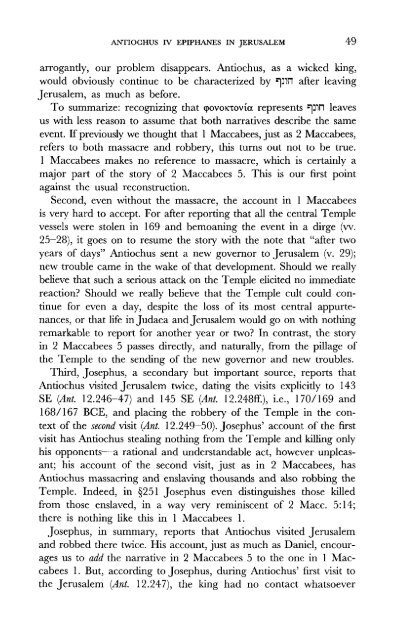historical perspectives: from the hasmoneans to bar kokhba in light ...
historical perspectives: from the hasmoneans to bar kokhba in light ...
historical perspectives: from the hasmoneans to bar kokhba in light ...
You also want an ePaper? Increase the reach of your titles
YUMPU automatically turns print PDFs into web optimized ePapers that Google loves.
ANTIOCHUS IV EPIPHANES IN JERUSALEM 49<br />
arrogantly, our problem disappears. Antiochus, as a wicked k<strong>in</strong>g,<br />
would obviously cont<strong>in</strong>ue <strong>to</strong> be characterized by after leav<strong>in</strong>g<br />
Jerusalem, as much as before.<br />
To summarize: recogniz<strong>in</strong>g that represents leaves<br />
us with less reason <strong>to</strong> assume that both narratives describe <strong>the</strong> same<br />
event. If previously we thought that 1 Maccabees, just as 2 Maccabees,<br />
refers <strong>to</strong> both massacre and robbery, this turns out not <strong>to</strong> be true.<br />
1 Maccabees makes no reference <strong>to</strong> massacre, which is certa<strong>in</strong>ly a<br />
major part of <strong>the</strong> s<strong>to</strong>ry of 2 Maccabees 5. This is our first po<strong>in</strong>t<br />
aga<strong>in</strong>st <strong>the</strong> usual reconstruction.<br />
Second, even without <strong>the</strong> massacre, <strong>the</strong> account <strong>in</strong> 1 Maccabees<br />
is very hard <strong>to</strong> accept. For after report<strong>in</strong>g that all <strong>the</strong> central Temple<br />
vessels were s<strong>to</strong>len <strong>in</strong> 169 and bemoan<strong>in</strong>g <strong>the</strong> event <strong>in</strong> a dirge (vv<br />
25-28), it goes on <strong>to</strong> resume <strong>the</strong> s<strong>to</strong>ry with <strong>the</strong> note that "after two<br />
years of days" Antiochus sent a new governor <strong>to</strong> Jerusalem (v. 29);<br />
new trouble came <strong>in</strong> <strong>the</strong> wake of that development. Should we really<br />
believe that such a serious attack on <strong>the</strong> Temple elicited no immediate<br />
reaction? Should we really believe that <strong>the</strong> Temple cult could cont<strong>in</strong>ue<br />
for even a day, despite <strong>the</strong> loss of its most central appurtenances,<br />
or that life <strong>in</strong> Judaea and Jerusalem would go on with noth<strong>in</strong>g<br />
remarkable <strong>to</strong> report for ano<strong>the</strong>r year or two? In contrast, <strong>the</strong> s<strong>to</strong>ry<br />
<strong>in</strong> 2 Maccabees 5 passes directly, and naturally, <strong>from</strong> <strong>the</strong> pillage of<br />
<strong>the</strong> Temple <strong>to</strong> <strong>the</strong> send<strong>in</strong>g of <strong>the</strong> new governor and new troubles.<br />
Third, Josephus, a secondary but important source, reports that<br />
Antiochus visited Jerusalem twice, dat<strong>in</strong>g <strong>the</strong> visits explicitly <strong>to</strong> 143<br />
SE (Ant. 12.246-47) and 145 SE (Ant. 12.248ff.), i.e., 170/169 and<br />
168/167 BCE, and plac<strong>in</strong>g <strong>the</strong> robbery of <strong>the</strong> Temple <strong>in</strong> <strong>the</strong> context<br />
of <strong>the</strong> second visit (Ant. 12.249-50). Josephus' account of <strong>the</strong> first<br />
visit has Antiochus steal<strong>in</strong>g noth<strong>in</strong>g <strong>from</strong> <strong>the</strong> Temple and kill<strong>in</strong>g only<br />
his opponents—a rational and understandable act, however unpleasant;<br />
his account of <strong>the</strong> second visit, just as <strong>in</strong> 2 Maccabees, has<br />
Antiochus massacr<strong>in</strong>g and enslav<strong>in</strong>g thousands and also robb<strong>in</strong>g <strong>the</strong><br />
Temple. Indeed, <strong>in</strong> §251 Josephus even dist<strong>in</strong>guishes those killed<br />
<strong>from</strong> those enslaved, <strong>in</strong> a way very rem<strong>in</strong>iscent of 2 Macc. 5:14;<br />
<strong>the</strong>re is noth<strong>in</strong>g like this <strong>in</strong> 1 Maccabees 1.<br />
Josephus, <strong>in</strong> summary, reports that Antiochus visited Jerusalem<br />
and robbed <strong>the</strong>re twice. His account, just as much as Daniel, encourages<br />
us <strong>to</strong> add <strong>the</strong> narrative <strong>in</strong> 2 Maccabees 5 <strong>to</strong> <strong>the</strong> one <strong>in</strong> 1 Maccabees<br />
1. But, accord<strong>in</strong>g <strong>to</strong> Josephus, dur<strong>in</strong>g Antiochus' first visit <strong>to</strong><br />
<strong>the</strong> Jerusalem (Ant. 12.247), <strong>the</strong> k<strong>in</strong>g had no contact whatsoever

















